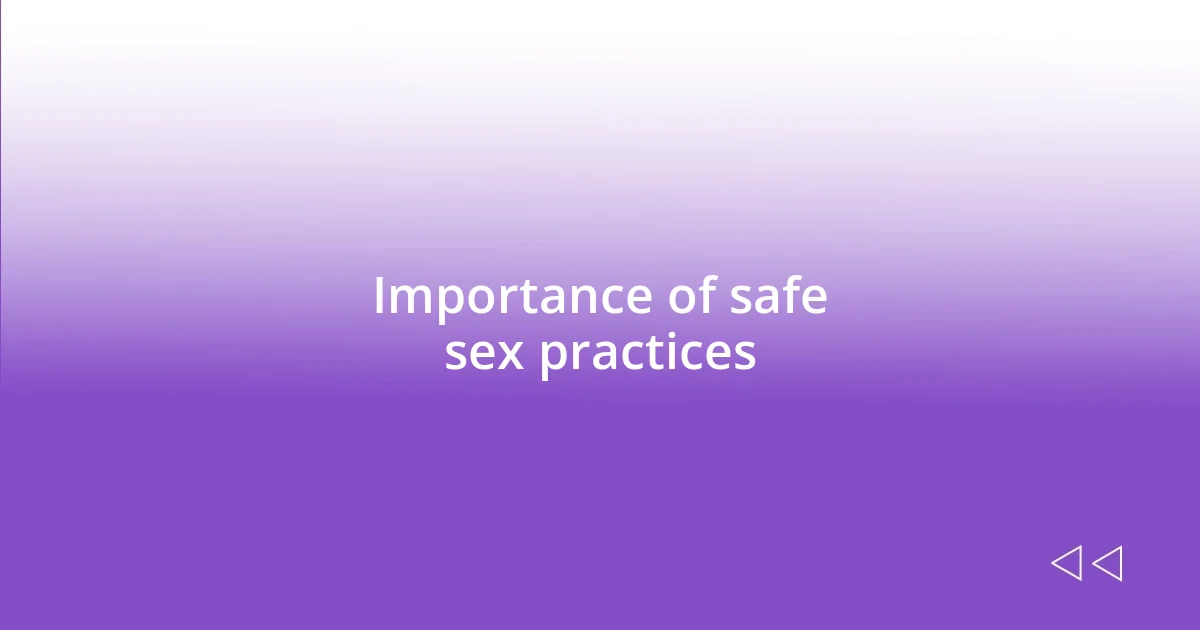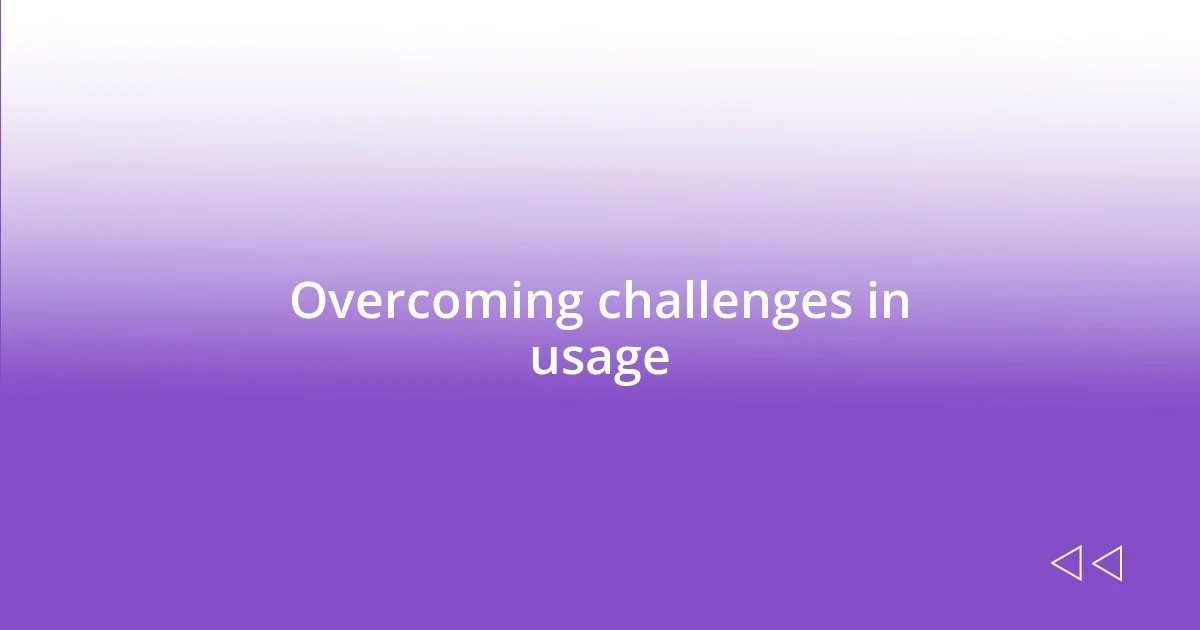Key takeaways:
- Microbicides provide individuals with greater control over their sexual health by offering alternative protection against STIs and unintended pregnancies.
- Engaging in open conversations about safe sex practices fosters trust and empowerment, which can change the narrative surrounding sexual health discussions.
- Overcoming challenges related to microbicide use, including stigma and partner communication, is essential for fully integrating them into personal health routines.

Understanding microbicides in depth
Microbicides are fascinating because they offer a unique way to empower individuals in managing their sexual health. I remember the first time I heard about them; it sparked a curiosity in me that led to countless questions. Why wasn’t there more conversation about this option? It felt like a game-changer for people looking for more control over their sexual experiences, especially for those who can’t always rely on partner compliance with condom use.
These substances can be applied topically, either in the form of gels, creams, or other methods, to prevent sexually transmitted infections (STIs) and even unintended pregnancies. It’s remarkable to think about how this technology works—it actively interacts at the molecular level to inhibit pathogens from entering the body. Personally, I find it inspiring to know that such innovations exist, yet I often wonder why awareness remains so limited.
The emotional aspect of microbicides can’t be overlooked. Many individuals view it as a beacon of hope in a world where STIs still carry significant stigma. I’ve seen friends hesitant to discuss their sexual health out of fear; the idea of microbicides can change that narrative. Why should anyone feel shame about taking charge of their health? By openly discussing these options, we can cultivate a more supportive environment, encouraging everyone to prioritize their well-being.

Importance of safe sex practices
Engaging in safe sex practices is essential for protecting not just individual health, but the well-being of our communities as well. I often reflect on the times my friends and I would casually discuss our experiences, and it always struck me how many shared a misunderstanding about the risks involved. Safe sex isn’t merely about avoiding unintended pregnancies; it’s fundamentally about safeguarding against sexually transmitted infections (STIs) that can have lifelong consequences.
Here are a few critical reasons why practicing safe sex is important:
- Prevention of STIs: Regular use of barriers, like condoms, significantly reduces the risk of transmitting infections.
- Empowerment: Having the knowledge and resources to practice safe sex fosters a sense of control over one’s sexual health.
- Trust and Communication: Open discussions about safe sex practices between partners can strengthen relationships and build trust.
- Reducing Stigma: By prioritizing safe sex, we contribute to normalizing conversations about sexual health, making it easier for others to seek help or information.
- Long-Term Health: Commitment to safe sex not only enhances personal health but also shines a light on community wellness, reducing the overall prevalence of STIs.
In my journey, I’ve seen how a simple conversation about safe sex can empower someone to make healthier choices. When I shared my own experiences with a close friend who had been hesitant to discuss her sexual health, it opened a floodgate of dialogue that changed her perspective completely. The moment she realized that safe sex wasn’t just about rules, but rather about caring for herself and her partners, things shifted. It’s a powerful reminder that safe sex is not just a personal responsibility; it’s a collective commitment to health and empowerment.

My first experiences with microbicides
My first encounter with microbicides was both enlightening and somewhat overwhelming. I remember being at a health seminar focused on sexual health, where the speaker introduced the concept of microbicides. They shared a personal story about how these products had changed their approach to sexual well-being. It made me think, “Could this be my new tool for empowerment?” The idea that I could choose to protect myself, regardless of partner compliance, was a spark of excitement mixed with a hint of anxiety about the societal perceptions surrounding it.
As I began to explore microbicides further, I found myself grappling with a whirlwind of emotions. The practical aspects seemed straightforward—using a gel or cream before intercourse promised a new layer of protection. But I also felt apprehensive, especially about how to discuss this with my partners. It felt like there was still a cloud of stigma around any method apart from condoms. I shared my feelings with a close friend, and we both realized we had the same worries. It’s comforting to know that these conversations are becoming more common, and we all have a choice to redefine how we protect our health.
Reflecting on those early days, I can honestly say that understanding microbicides was a journey of empowerment. I came to realize that microbicides could not only help me feel safe but could also enhance my intimate experiences. One time, I used a microbicide gel for the first time, and I was surprised to find it to be just as effective as it was liberating. It allowed me to engage in the moment fully, without the constant worry of STIs looming overhead. This innovative approach brought an unexpected level of confidence, allowing me to enjoy my connections more deeply – an experience I’ll cherish forever.
| Aspect | Personal Experience |
|---|---|
| Initial Reaction | Curiosity and a bit of anxiety about societal stigma |
| Emotional Journey | Empowerment mixed with apprehension in discussing with partners |
| First Use Experience | Surprisingly liberating and confidence-boosting |

Evaluating microbicide options available
Evaluating microbicide options available involves examining various products that promise to enhance sexual health. In my experience, I found myself overwhelmed by choices. With products like gels and films on the market, I had to ask myself: Which is most effective for my needs? I often turned to trusted resources and community forums for guidance. The wealth of information helped shape my understanding and preferences.
One product that particularly stood out was a gel that not only acted as a barrier against STIs but also added a level of lubrication. It felt like a game-changer to me. The first time I used it, I remember thinking how freeing it was, knowing I had control over my sexual health. It allowed me to focus on intimacy rather than anxiety. Has anyone else felt that shift in their mindset? I believe this is crucial for anyone evaluating their options—finding something that aligns with personal comfort and effectiveness.
As I navigated the selection process, it became essential to consider the personal aspects too. For instance, how could I approach a partner about using a microbicide? Having open conversations during those moments felt vital. I realized that evaluating microbicides wasn’t just about analyzing the product; it was about fostering trust and communication in relationships. Each experience brought me closer to making informed choices, reinforcing my belief that these innovations could change the way we think about safe sex.

Integrating microbicides in daily routine
Incorporating microbicides into my daily routine felt like a transition into a new chapter of self-care. I remember the first time I made a conscious decision to integrate it. It wasn’t just another product; it became a part of my pre-intimacy ritual. The routine itself felt empowering, like I was actively participating in my sexual health rather than leaving it to chance. Have you ever felt that tangible shift when you add something meaningful to your routine?
As I settled into this new rhythm, I discovered that timing was everything. I learned to always have my microbicide handy; it became second nature. I would keep it on my nightstand, like a gentle reminder of my commitment to safe sex. This simple act reduced my anxiety and helped me feel prepared, allowing me to focus more on the experience itself instead of worrying about potential risks. It was fascinating how such a small adjustment could significantly impact my mindset.
Sharing my journey with friends also played a crucial role. I found that discussing my routine helped normalize the conversation around microbicides. When one friend expressed the same apprehensions, I felt a sense of camaraderie. This connection reinforced my belief that integrating microbicides wasn’t just about individual health but about opening dialogues around safe sex that others could relate to. It made me wonder: could transparency lead to more empowered choices across the board?

Overcoming challenges in usage
Navigating the complexities of using microbicides has been a journey filled with its own set of challenges. I vividly recall the moments when I feel uncertain about how effectively I was using the products. At times, I found myself fidgeting, questioning whether I was applying them correctly. Have you ever experienced that nagging worry? It really made me appreciate the importance of education. The more I learned about proper usage and application, the more confident I felt in my choices.
One challenge I faced was discussing these products with my partner. I remember the first conversation—it felt monumental. Would my partner be receptive? Would they understand my reasons for wanting to use microbicides? I realized that vulnerability plays a crucial role in these discussions. Opening up about my own apprehensions and motivations led to a more relaxed dialogue. It wasn’t just about the microbicides themselves but about building a stronger connection grounded in mutual care for each other’s health.
Over time, I found that surrounding myself with supportive friends made a huge difference in overcoming any lingering doubts. Sharing experiences, whether it was successes or concerns, helped me realize I wasn’t alone in this journey. One friend shared her story about a product that didn’t work for her, and it encouraged me to speak more openly about my own experiences. How much easier would it be if we all felt comfortable discussing these subjects? I believe that fostering a community where we can share and learn from one another can empower all of us to navigate our journeys with microbicides more effectively.














